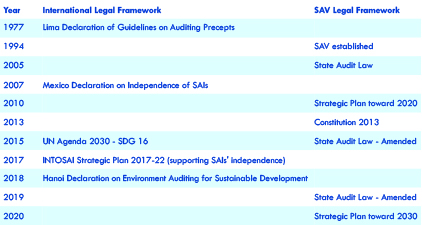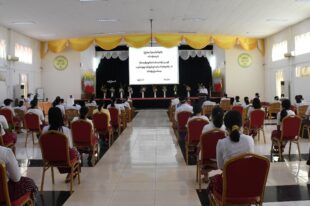by Thanh Hai VU, Director General of Legal Affairs Department, and Duong Tan CAO, Head of Bilateral Division, State Audit Office of Vietnam
Introduction
Supreme Audit Institutions (SAIs) play a vital role in confirming that public spending controls are working properly, and in recommending how public sector organizations can act in a more efficient and transparent manner. They also provide citizens with confidence that governments are using public resources in ways that maximize their value and deliver results. However, SAIs have difficulty instilling that confidence if they are not independent.
Since it was established nearly 30 years ago, the State Audit Office of Vietnam (SAV) has become progressively more independent, in accordance with the principles of the 1977 Lima Declaration, the 2007 Mexico Declaration, and more recently, the United Nations’ 2030 Agenda for Sustainable Development. SAV’s journey toward independence has involved both legal and practical considerations.
SAV’s independence has helped it to play an increasingly important role in the nation’s development and international integration, particularly in ensuring transparent and sustainable public finances. SAV has also intensified its efforts to contribute more substantively to the regional and international public audit community. SAV was proud to be one of the co-founders of the Association of Southeast Asian Nations’ Supreme Audit Institutions (ASEANSAI) in 2011, and from 2018 to 2021, it has served as chair of the Asian Organization of Supreme Audit Institutions (ASOSAI).
Achieving Legal Independence
The importance of independent government auditing was first recognized in the 1977 Lima Declaration. The core principles outlined in the 2007 Mexico Declaration on SAI Independence included the need for “de jure independence” through a constitutional, statutory, and legal framework.
Like many other SAIs, SAV’s legal independence has been an arduous journey (see figure 1). In its first decade, SAV was an executive branch agency under the direct control of the Prime Minister. SAV became an independent agency when the first State Audit Law was passed in 2005. The law stipulated that SAV was an independent state financial inspection agency established by the National Assembly, and that it was to act strictly in accordance with the law. SAV was charged with conducting financial, compliance, and performance auditing of all departments and organizations in the country that use the public budget, resources, and assets.

In 2013, the legal status of SAV and the Auditor General was enshrined for the first time in the Constitution of Vietnam. Like the State Audit Law, the Constitution stipulated that SAV was an independent agency set up by the National Assembly, to abide soley by the law.
The Constitution also enhanced SAV’s independence and operation; specified the legal status, functions, powers, and organization of SAV; and clearly identified the responsibilities of agencies, organizations, units, and individuals associated with SAV. For example, the Constitution specified that the Auditor General was the head of SAV and responsible to the National Assembly for the agency’s operation.
The State Audit Law was amended in 2015 and 2019 to create effective, accountable, and transparent institutions at all levels and in all fields, in compliance with the Constitution; other laws, such as the State Budget Law and Anti-corruption Law; and ASOSAI’s 2018 Hanoi Declaration on Environment Auditing for Sustainable Development.
Achieving Practical Independence
While formal constitutional and legal provisions are important, SAIs’ independence involves much more than a set of rules. It is also essential for SAIs to exercise what the Mexico Declaration refers to as “de facto” or practical independence, which has organizational, functional, and financial dimensions.
Organizational Independence. The Auditor General is the head of SAV and is elected by the National Assembly to a five-year term. The Deputy Auditor General is appointed and can be dismissed by a Standing Committee of the National Assembly. Specialized Audit Departments and Regional Audit Offices are led by Directors General, who are appointed and can be dismissed by the Auditor General. Currently, SAV has 32 Departments and Regional Offices, with about 2,500 employees; all auditors have a university degree or higher. Staff competencies, as well as professional training requirements, enhance SAV’s operational autonomy.
Functional Independence. SAV develops its audit plan independently, applies audit methods, conducts audits, and reports the results to the National Assembly. SAV’s auditors have the right to access information and documents that fall within the scope of audits. SAV maintains good relationships with legislative, executive, and judicial agencies, and works with the media to communicate with the public about its activities. In 2016, in an effort to standardize national public audit practices, SAV issued a set of 39 public sector audit standards based on the International Standards of Supreme Audit Institutions.
Financial Independence. SAV has the necessary resources for its activities, but these resources are still subject to the intervention of the Ministry of Finance. The State Audit Law stipulates that SAV shall determine its operational costs and send them to the government for synthesis, subject to a decision by the National Assembly. In theory, this requirement could impact SAV’s budget, and may be an issue to examine at the time of future revisions to the State Audit and State Budget laws.
In sum, SAV now enjoys both legal and practical independence, and is exercising it to effectively monitor the use of public funds and property. Through its audits, SAV is supporting the National Assembly and People’s Councils at all levels and has contributed to combating corruption, loss, and waste; detecting and preventing violations of the law; and helping government agencies achieve greater efficiency.
The Way Forward: Sustainable Independence & SDG 16
Achieving sustainable independence is a process, not a product, and that process has both milestones and roadblocks. For that reason, it is essential that SAIs vigilantly guard their independence by remaining relevant, providing stakeholders with assurances, and adapting to changing conditions. Just as governments adopt new ways of delivering services, SAIs must remain flexible in how they conduct audits. SAIs should also be ready to propose new legal powers, when necessary, such as the right to audit the flow of public funds.
Sustainable independence is a key element in efforts to achieve SDG 16, which calls for “peace, justice, and strong institutions.” SDG 16 can be accomplished by eliminating fraud and corruption; establishing efficient, accountable, and transparent structures at all levels; maintaining public access to information; and protecting fundamental freedoms in compliance with national legislation and international agreements.
SDG 16 defines several goals for SAV to achieve by 2030, in line with the core value of sustainable independence. First, SAV aims to enhance its operational capacity and audit quality, efficiency, and effectiveness, to strengthen its ability to monitor the use of public funds and assets. Specifically, SAV aims to enhance its capacity to conduct performance audits, and to strengthen its legal mandate to allow for greater access to information.
Second, SAV plans to develop, in phases, into a highly professional institution, to keep pace with the country’s modernization while continuing to adhere to international standards and best practices. SAV will focus on building its digital infrastructure and implementing automation to support its activities.






